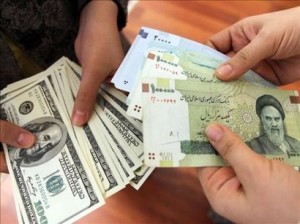 In the past few days there have been a string of reports regarding the harmful impact of sanctions on the Iranian population. Issues related to rising prices, the�inability to import medicine�for life threatening diseases because of financial sanctions and even�life threatening pollution�caused by domestically-produced gasoline, have all received ample attention in the Western press. On Saturday, two additional airlines � KLM and Austrian Air ��announced�the suspension of flights to Iran (Austrian Airlines by January 13 due to a lack of demand and KLM by April).
In the past few days there have been a string of reports regarding the harmful impact of sanctions on the Iranian population. Issues related to rising prices, the�inability to import medicine�for life threatening diseases because of financial sanctions and even�life threatening pollution�caused by domestically-produced gasoline, have all received ample attention in the Western press. On Saturday, two additional airlines � KLM and Austrian Air ��announced�the suspension of flights to Iran (Austrian Airlines by January 13 due to a lack of demand and KLM by April).Inside Iran, one parliamentarian went so far as to suggest that Western sanctions are moving toward the direction of the Iraqi food for oil program. Meanwhile, political institutions seem to be in complete deadlock over the direction of economic policy. The government is once again late in forwarding its budget to the Parliament despite complaints. The Parliament in turn has voted to suspend the second phase of the government�s much touted Targeted Subsidy Reform Act, fearing fuel price increases will worsen the already out of control inflation rate which according to the Central bank of Iran now stands at 27.4 percent (more independent observers think that it could be higher than 40 percent). Even Iran�s Chamber of Commerce,�Industries, and Mines is siding with the Parliament. In a public statement it called for the suspension of the second phase until the government fulfills the obligations it had in the first phase to the industrial and agriculture sectors. According to the head of the Chamber, Mohammad Nahavandian, the government has yet to pay 30 percent of its commitments to these sectors. The country is awash with rials due to the expansionist fiscal policies of the past few years but industry and agriculture are�faced with liquidity shortages�due the government�s lack of payment for services preformed, he said.
Mahmoud Ahmadinejad thinks otherwise. He went to the Parliament on Wednesday to make his case for implementing the second phase of the subsidy reform but there was even conflict over whether the president should have just given a speech or also face questions from MPs. Iranian television announced that it would have a live program debating subsidy reform on Sunday, followed by a poll. But the program was cancelled at the last minute on the pretext that this action was intended �to create a tranquil environment for the airing of the president�s views.�
All this brings attention to the questions of how bad the economic situation really is in Iran and whether we are finally witnessing a country that is on the brink. However, a study done for the�Oxford Institute for Energy Studies�suggests that these are the wrong questions to ask; they lead Iran watchers to ignore important debates and changes that are taking shape in order to counter the impact of sanctions. Conducted by William Yong and Alireza Hajihosseini, the study is not very instructive in terms of the extent to which these debates and changes will be successful in countering the preponderant force of sanctions. But the authors are rather persuasive in their criticism of the infatuation with the one-sided impact of sanctions without giving due attention to �how sanctions are being absorbed by Iran�s political elites in a dynamic and continuous fashion.� They suggest that the portrayal of Iran as perpetually �on the brink while confounding us with the fact that it has not yet tumbled� prevents us from examining the dynamic manner in which the Islamic manner is trying to respond to challenges posed.
The force of sanctions has surprised the leadership of the Islamic Republic, but Yong and Hajihosseini argue that it�s now in adjustment mode with both the short and medium term in mind. In the short term, the fight will play out over the budget. Rather than bemoaning the president�s performance, the focus has shifted to �fiscal management that reflects new realities.� The fight will be over the extent of budget contraction, how to increase revenues, and what the estimated oil price in the budget should be and at what currency rate. This budget fight happens every year, but it has taken on new urgency in the midst of �new realities.� Yong and Hajihosseini suggest that the Petroleum Ministry will be a more important player as it becomes increasingly wary of being a hollow structure overseeing companies (including the National Iranian Oil Company) that have been treated as cash cows for the government. It will be pushing for a greater share of oil revenues for investment purposes.
None of this may work. After all, Iran has been trying to wean itself from oil revenues since forever. But necessity may indeed turn out to be the mother of all inventions. The heated debates and efforts suggest that the Iranian political class has now turned its attention to domestic economic restructuring and economic resources that can be generated from inside the country in order to address shortfalls and problems caused by sanctions. Despite their acknowledgment of severe economic difficulties, they are behaving as though they do not believe that Iran is on the brink.
By Lobelog
The Iran Project is not responsible for the content of quoted articles.










